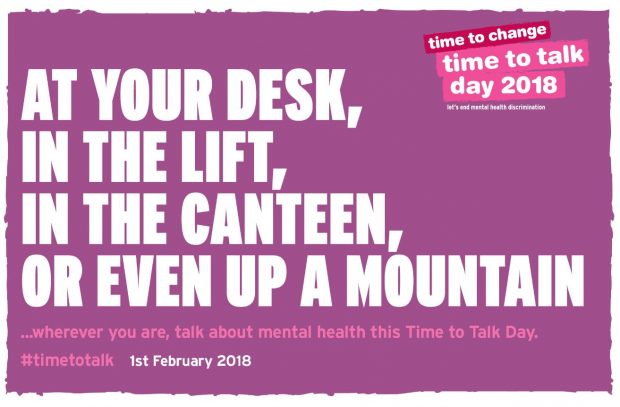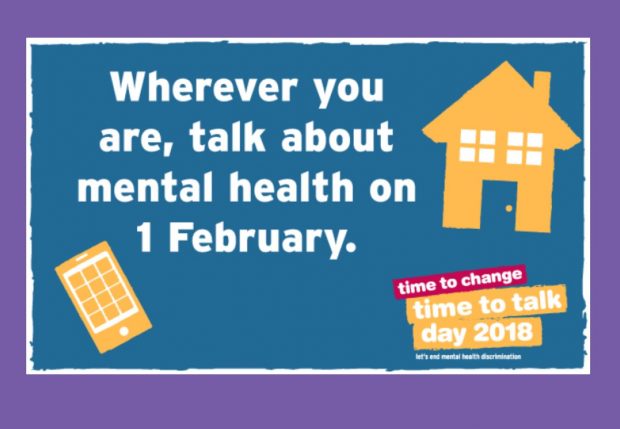
I’ve struggled with depression and anxiety for as long as I can remember.
Before working at DWP Digital, I would rarely talk about these issues for fear of ridicule. I was afraid that people wouldn’t take me seriously or that they would brand me ‘dramatic’. This is why it’s important to raise awareness, and Time to Talk Day is a way to bring people together to break the silence around mental health problems.

Don’t be afraid to talk
Getting people to talk about mental health will help to break down stereotypes and educate people. With mental health conditions affecting one in four of us, it’s important that people aren’t afraid to talk about how they’re feeling.
In the past, people’s lack of understanding has led me to bottle everything up. Everyone seemed to have an opinion. Whether it was professionals, friends or family, I’d often be told: “Cheer up mate.” “What do you have to be down about?” and “Things can’t be that bad”.
For males, it can be especially hard to talk about how you feel. Growing up we’re often told to “man up”, “be a man” and that “boys don’t cry.” Phrases like these are why I’d say nothing; why I’d drift through life hiding the lows and pretending to be ok.
But when you’re conditioned to never talk about how you really feel, the only way to express anything is often anger. And that isn’t good for anybody.
My mental health journey
My anxieties go way back. The need for acceptance and the need to fit in runs deep. But, I’ve always known I was different.
I grew up in Newcastle, where parties, fashion, clubbing and drinking are all part of normal life. I hated the large crowds, strangers and rowdy drunks. These volatile situations would send my anxieties into overdrive.
I find it difficult to admit, but my coping mechanism was to try not to think about anything at all. I went through some dark times, because the only way to achieve this was to get so intoxicated that my brain couldn’t think of anything to worry about.
Looking back, I realise this behaviour made me hate myself. I wasn’t addressing the issue and my coping mechanism was just causing me to self-destruct.
The trouble with a coping mechanism is that it never addresses the problem. It doesn’t ever make you feel better. It just delays the onset of despair and amplifies it when it arrives.
As a designer, I’m a creative person. And my experience is that creative people tend to think more. By this, I don’t mean they’re more intelligent, I just mean creative people are more likely to dwell on something that others may overlook. But it’s this attention to detail that makes us good at what we do.
I can also be over analytical in the view I take of my work and feel that I don’t deserve any of the credit I receive. These feelings are strengthened when working in a multidisciplinary team, where ideas are shared and built upon. I’ll often believe that the team has carried me, or that somebody else handed me an idea.
This inability to accept an accomplishment despite the evidence is called ‘imposter syndrome’. This inner battle for perfection and not feeling that what I’ve done is good enough is why I can’t let go easily. It’s why I play scenarios out in my head over and over again.
Ruminating like this is often my catalyst for depression. It’s a constant battle with myself to be better, without ever feeling like I achieve it.
Learning to deal with mental health issues
So over time I’ve learnt new ways to cope:
- Learn to internalise any external verification - when somebody compliments me, I try to believe them. Very few people hand out lies as compliments. So, if they tell me they like my work, they do. I’ll say thank you and pat myself on the back, rather than looking for ways I could have done it better.
- Surround myself with positive, like-minded people - if people are negative I don’t associate with them. One of the biggest problems in my life was the belief that I had lots of friends. I didn’t. I had lots of acquaintances. So now I walk away from people who make me feel anxious about being myself.
- Don’t struggle in silence - if I’m feeling anxious or depressed, I talk to somebody. Friends. Family. My manager. Just talking about it makes the load seem lighter.
- Look for flaws in others - I don’t mean I make things difficult for people, or point out their mistakes, but I do notice them. Nobody is perfect. It’s what makes us human. Recognising this helps me to come to terms with any mistakes I make.
- Face fears - all anxieties stem from fear. I often imagine the worst possible outcome for any scenario. My counsellor calls this ‘catastrophising’. But it’s extremely rare that the actual outcome is as bad as I’ve imagined. So, every time I’m scared, I try to pay attention to how things actually play out compared with how I feared they would. This can help rationalise those fears in future, which reduces the stress of the entire scenario.
- Discover what makes me happy - most people think more money will make them happy. But depression doesn’t go away no matter how much money you have. For me, I’m most happy when I’m helping people.
- Don’t conform - if I don’t want to do something, I’m no longer afraid to say no. I’m now virtually teetotal because I don’t enjoy drinking or partying. I never have. People may think it’s boring, but so what?
- Be true to myself – this is the most important coping strategy! I make sure to always be myself. Individuality is what makes us human. We should embrace and celebrate the fact that everybody is different. How could I ever escape depression if I’m suppressing who I am?
Supporting others
I’m not an expert. I can’t give medical or legal advice. But I can offer support.
If one in four of us experience mental health needs at some point, it’s likely you’re already working with people that may need your support.
But the environments we work in often don’t feel safe enough for us to be open about how we feel. Less than half the people diagnosed with a mental health problem actually tell their manager.
Sometimes there are clues. People may appear tired, anxious or withdrawn. They may struggle, find it hard to make decisions or find solutions to problems. But, it’s important to remember everyone’s mind is different.
There may be no outward signs that somebody is suffering and you should never make assumptions about people’s mental health - good or bad. This is why it’s important to create an open culture where people feel comfortable.
If you think somebody you work with may be struggling with their mental health, just talk. It shouldn’t be difficult to ask, “How are you doing?” People often want to talk about it but don’t feel able to bring it up themselves.
Sometimes when managers lack confidence about mental health they may make this conversation overly formal, and this can compound the problem. A person may not want to be referred to HR or occupational health. They may just need a quiet talk over a hot drink, and to know that people care about their wellbeing.
And finally…

Keep talking. By taking away the taboos on mental health we’ll improve relationships, aid recovery and take the stigma out of something that affects us all. We need to take proactive steps to create a more open and supportive culture. Not just in the workplace, but around mental health in general.
It won’t happen overnight, but the individual relationships between people are the key to getting this right. If people receive the support they need quickly, it can help steer them away from developing a more serious problem.
You can find out more about what's happening in DWP Digital by subscribing to this blog and following us on Twitter @DWPDigital. Visit our DWP Digital Careers website and have a look at our LinkedIn page.

58 comments
Comment by Ruth posted on
Great article Craig. Thanks.
Comment by Craig Abbott posted on
Thanks Ruth. Appreciate you taking the time to read it.
Comment by lyndsaycecil posted on
Loved your blog Craig, really honest, and you've shared so many great tips that I'm certain will help others. Thank you.
Comment by Craig Abbott posted on
Thank you for your kind words. Really appreciate it. =)
Comment by Sharron posted on
Great article Craig, loved your honesty and ideas on how you cope. I'm sure it will help many other people that often suffer far too long in silence.
Comment by Craig Abbott posted on
Thank you, Sharron. Even if it helps just one person it was worth sharing. =)
Comment by Laura posted on
I love your blog Craig. It rings so many bells with me about people close to me. Thanks for being so honest and also sharing your tips. Hope it helps others struggling with the same feelings.
Comment by Craig Abbott posted on
Thanks, Laura. Appreciate you taking the time to read through it.
Comment by Stuart Andrews posted on
A great read, and there will be situations when perhaps someone cannot share their fears or talk about their mental health, but reading your blog can provide some reassurance.
Comment by Craig Abbott posted on
Thanks, Stuart. I think you're right. There will always situations where people don't feel like they can share. But hopefully, by talking about these things more often it will normalise it and the number of these situations will reduce.
Comment by Diana Day posted on
Great Article Craig. Honest and open, something I can honestly register with, trouble is the majority of people that never have a mental issue will never be able to fully understand. Your final comment is so true. I opened up to my boss at BT in 1995 and said when I say to you time for a coffee it's time for us to have a chat, it was my coping mechanism, when he listened he got to understand the real me and what made me tick. Since then when I have worked for a manager that shows compassion I've said the same. Only these people really get to understand. I'm still very frustrated at the lack of opportunity as I know I have so much more to offer. I feel like a square peg in a round hole.
good luck with everything the future is bright 🙂
Diana
Comment by Craig Abbott posted on
Hi Diana. I think you're right. There will always be people that just don't get it. But for those of us that do, we can still offer a lot of support to those that need it. =)
Comment by Elizabeth posted on
Thank you for sharing - I see a reflection of myself in some of the things you've written.
One of my friends cried as she read your blog.
She said it was like you had reached into her mind and expressed the things she can't.
Comment by Craig Abbott posted on
Hi Elizabeth. This comment really moved me. Tell your friend I'm sorry for making her cry, but I am glad if it helped in some way. I hope she is ok. Thank you for taking the time to read and share. =)
Comment by Jo Shaw posted on
Thank you so much - your honest sharing of your experience has been so helpful. Made me pause and think.
Comment by Craig Abbott posted on
Hi, Jo. Glad it was helpful. Thanks for taking the time to read through it.
Comment by Karen Camposano posted on
A very honest blog Craig. Thank you so much for sharing your experience and how important taking time to talk is. And also for sharing tips too to help others in the same or similar situation. I wish you well for the future.
Comment by Craig Abbott posted on
Hi, Karen. Thanks. Appreciate you taking the time to read through it. =)
Comment by Laura posted on
Thanks for writing such an honest blog post.
Much of what you wrote really struck a chord.
Comment by Craig Abbott posted on
Hi, Laura. Thank you. I hope it was of some use. =)
Comment by Nigel Worsley posted on
Excellent stuff Craig, thanks for sharing.
Comment by Craig Abbott posted on
Hi Nigel, thanks for reading. =)
Comment by Berny Hussey posted on
Thanks for sharing your story Craig.
The solutions you have for coping are really interesting .
I have shared your page with my 2 collegues and we will all be dialling into the telekit.
Wishing you all the very best .x
Comment by Craig Abbott posted on
Hi Berny, glad you found it interesting. Thanks for sharing it with your colleagues. Appreciate it. =)
Comment by Jeanette Halliday posted on
Great article Craig and thank you for sharing your tips. Your blog struck a chord with me and I am sure it will be helpful to others.
Comment by Craig Abbott posted on
Hi Jeanette, thanks for taking the time to read through it. Appreciate it =)
Comment by Stacey Knowles posted on
Craig, thank you for sharing this. I know this will resonate with so many colleagues, and will help people understand they're not alone.
Comment by Craig Abbott posted on
Hi, Stacey. I hope you're right. We often think this doesn't happen to other people. By sharing, hopefully, it will normalise it a bit more for all of us. =)
Comment by Marissa Desoysa posted on
Thanks Craig for sharing. So honest and will ring true for many. In Sheffield we have a Mental Health well being group and although we don't claim to be experts we are there to listen and be there for everyone. Thanks
Comment by Craig Abbott posted on
Hi, Marissa. That's amazing. Great work! I think we could do with a few more of those.
Comment by Leighton Jukes posted on
Craig, a truly great article and one that I hope people will remember. As someone who has suffered in the past and still does on occasion (I take Citalopram to help combat it), it certainly resonated with me.
I've posted a link on the Message Wall to try and encourage more people to read your blog. Thank you for writing it.
Comment by Craig Abbott posted on
Hi, Leighton. Thanks for taking the time to read and share it. I'm glad to hear you're suffering less these days. Best wishes for the future. =)
Comment by janet brown posted on
I love this article.Thank you for being so honest.
We'll never end the stigma if we're not honest.
Comment by Craig Abbott posted on
Hi, Janet. Thanks for taking the time to read it. I totally agree. The more we talk about it, the more normal it will become!
Comment by Liz Peddie posted on
Brilliant article - thanks Craig for sharing & being so honest, I'm sure your thoughts will be familiar to many people, myself included & it's good to know that there are ways of coping which can really help.
Comment by Craig Abbott posted on
Hi, Liz. Thanks for taking the time to read through it. I'm glad it was of some use to you. =)
Comment by Graham Millward posted on
A great blog Craig. My line manager pointed me to it. There are so many things in it that are just like me.
Comment by Craig Abbott posted on
Hi, Graham. Thanks for the kind words. I hope it was of some use to you. I'm glad to hear it was your line manager that pointed you to it. This sounds supportive. =)
Comment by Jan Legge posted on
Hi Craig, great blog and i can take some ideas from your coping mechanisms. Thank you for sharing xx
Comment by Craig Abbott posted on
Hi, Jan. Thanks for taking the time to read it. Appreciate it. I'm glad it could help you in some way. =)
Comment by Elaine posted on
Thank you for sharing, it makes it so much more likely that others will follow your example and start talking. Many Thanks, Kindest Regards. Elaine.
Comment by Craig Abbott posted on
Hi, Elaine. Thanks. I hope it does inspire people to start talking more. =)
Comment by Savi posted on
loved this blog. honesty is the best ! well done
Comment by Craig Abbott posted on
Hi, Savi. Thanks for taking the time to read through it. Appreciate the feedback. =)
Comment by Sue Waters posted on
Thanks for sharing Craig. I catastrophised for years without even realising. It took a counsellor to lift the curtain and now I know I am doing it and why I can give myself a shot in the but with positivity. It works, most of the time. I also find it helps to count the days achievments, even if it was just getting out of bed. All the best. Sue
Comment by Craig Abbott posted on
Hi, Sue. That's really good advice! I didn't even realise I was catastrophising until it came out during counselling. I think just being aware that I do it helps immensely because I can rationalise and see it for what it is.
Comment by Tiffanie posted on
Great article, thank you for being so open 😀
Tiffanie
Comment by Craig Abbott posted on
Hi, Tiffanie. Thanks for taking the time to read it. Appreciate it. =)
Comment by Brian Day posted on
Craig
Thank you for your honest and open story. I too suffer in the same way as you. It has been an uphill battle for most of my 56 yrs but I am now coping better. I go out to my colleagues in HMRC and talk about my trials with mental health and how they can help themselves and others.
People like us need to keep talking!
Your story was so amazing..well done
Comment by Craig Abbott posted on
Hi, Brian. I'm glad to head you're coping better these days. Thanks for taking the time to read the blog post. I think you're right. We do need to keep talking!
Comment by Loveday Ryder posted on
Thanks for your honesty, Craig. Really interesting to see your ideas on coping and so brilliant you have taken the time to explain all this for others to read.
Comment by Craig Abbott posted on
Thanks! I hope it was of some use to you. Thanks for taking the time to read through it.
Comment by Daphne posted on
What a wonderful blog, Craig. It takes guts to be so honest in such a public forum so I really commend you for it. Your story really resonated with me and love that you've given such great advice and tips 🙂
Comment by Craig Abbott posted on
Hi, Daphne. I'm glad you found it helpful. Thanks for reading.
Comment by Elinor posted on
Thank you for writing this and being so honest. It should help those who have similar problems. I hope that people who don't suffer from depression will also read it and try to understand a bit better how it can feel. Your comment on creative people tending to dwell more on what others may overlook I can really relate too. I have had people accuse me of over-thinking things. For some years I felt I was at fault for this. Fortunately I got over that. I still analyse everything. That's me and I will not apologise for it but I don't focus so much on the negatives now. Those who don't 'think' at all are the ones with the problem.
Comment by Craig Abbott posted on
Hi, Elinor. I'm glad you've got over thinking you were at fault. Some of us just overthink things. I've accepted I'm always going to be an overthinker. I just try to draw a line under stuff rather than finding faults with everything all the time.
Comment by A S Dev posted on
Thank you for this article - makes me feel like I am not the only one. It would be great if all employers were as aware of mental health issues as this.
Comment by Helen posted on
Brilliant. What a refreshing read. I can relate to it all especially the creatives thinking more 🙂